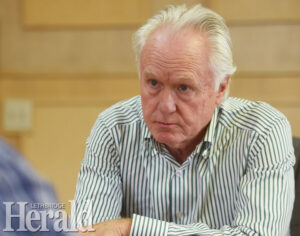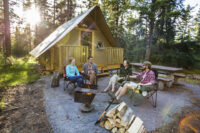Alberta senator doing virtual tour of the province
By Lethbridge Herald on September 26, 2020.
 Senator Doug Black is making his way across the province in a virtual cross-Alberta tour. Herald file photo by Tijana Martin
Senator Doug Black is making his way across the province in a virtual cross-Alberta tour. Herald file photo by Tijana MartinDale Woodard
Lethbridge Herald
Alberta Senator Doug Black is taking a cross-Alberta tour.
He’s just staying in the same spot.
With the COVID-19 pandemic playing havoc with social distancing and travel plans, Black moved his cross-Alberta tour online with virtual visits starting in Lethbridge earlier this week before moving on to Medicine Hat, Red Deer, Edmonton, Grande Prairie, Peace River and Fort McMurray.
“My commitment to Albertans when I ran and throughout my time I’ve served in Senate is to stay connected, that’s my job. What I’ve done pretty consistently is every time I’ve been around the province (I’ve been) listening and learning,” said Black. “This year I can’t do it, (but) I’m still committed to staying connected. So my office said ‘Maybe you should do a virtual tour.’”
First up on the virtual stop was Lethbridge and the stop made a good impression.
“If I continue to hear this through the remaining eight communities, I will never leave the province again,” said Black. “I had a good conversation with Mike Mahon at the University of Lethbridge. I talked to the mayor (Chris Spearman) and had a very good conversation with the mayor about the business issues, the closing of the supervised injection site (ARCHES) and what that has meant for the community. I had a good visit with (president and CEO) Paula Burns over at Lethbridge College. I talked to the executive director of the Alberta Sugar Beet Growers Association because I wanted a take on their industry and how that’s going. I talked to the Canadian Mental Health Association and the Lethbridge Chamber of Commerce and the superintendent of the Catholic School Division.
“Obviously business is important, but mental health is important and schools (are important). I wanted to know how it’s going integrating teachers and kids back into school and how it’s working for them.”
Agriculture was a big focus on the virtual trek to southern Alberta.
“I think as the agriculture industry knows, I am a big advocate for agri-business. It’s Alberta’s second-largest industry and I believe has the possibility to do so much more based upon innovation and technology in the sector. I think since I’ve started I’ve always made a point to connect with rural communities to come to understand how I can be helpful,” said Black. “The last couple of years I had been completely sidelined by federal policies in pipelines. There are only so many hours in a day and I’ve been consumed by the pipeline panels. But I’ve got to get back to agriculture and I’ve got to get back to innovation because both of those are huge parts of our future recovery. So that was the genesis of getting to southern Alberta now, I want to be back up on the learning curve and meet with the irrigation districts and get back up on the learning. So it’s starting, a bit at a time.”
So far, Black is hopeful by what he sees, but noted a few issues to be aware of.
“We need to be alert of competition issues and dumping issues of product. I think about sugar beets, we have to be very alert to the fact they grow a lot more sugar beets in Pakistan and Madagascar than we can, obviously because of our weather, and if we’re not attentive to train issues then we could find that industry is at risk. So we have to monitor that. We have to have space to move agricultural products and on a regular basis we find there are very, very substantial delays in getting agricultural products — whether it’s seed products or sugar beets — to market.
“I’m not criticizing because you don’t just build a new railway, but we have to be very mindful we are a land-locked jurisdiction and we have to have access to markets, whether it’s pipelines, rail links or road links, we have to have that. Those are the two things I’m attentive to, trade issues and transportation issues. I think we’re doing OK, (but) there’s room for improvement.”
As he resumes his virtual trip around the province, Black said he expects to hear issues ranging from the energy sector to unemployment to social issues ranging from family disruption and drug abuse.
It may not look good now, but Black said Alberta will turn itself around.
“I was born and raised in Alberta and I’m 68. This is the worst bump, it’s more than a speed bump,” said Black. “But I have been through challenges for decades and we are resilient and we are smart. We don’t put on airs and we’re not afraid to work. Are we going to get this fixed? You bet we’ll get this fixed. I can’t tell you exactly how and exactly when or what it’s going to look like, but four or five years for now we’re going to look at Alberta which is buzzing again.
“It’s going to be a restructured energy industry and a very strong solar and wind industry which Lethbridge will benefit from. We are going to find innovation is rampant through agriculture, through real estate and every field and a lot of that, if we’re smart, is going to be centred in Alberta because we have a lifestyle story to tell. But we’re going to have to fix this ourselves because there is not a willingness at all for Ottawa to help us through this problem. I regret to say that, it’s not a partisan comment, it’s just the facts. We’re going to fix it alone, but we’re going to fix it, full stop.”
Follow @DWoodardHerald on Twitter
-1



